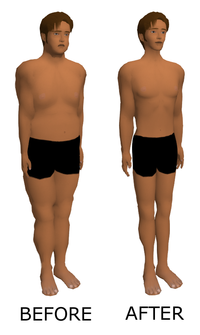
Photo from wikipedia
Background While bariatric surgery is well established as a means of inducing sustained weight loss, the rate of weight loss typically declines after a year, and weight regain has been… Click to show full abstract
Background While bariatric surgery is well established as a means of inducing sustained weight loss, the rate of weight loss typically declines after a year, and weight regain has been observed. Preoperative taste preferences have been suspected to play a role in weight regain, possibly by influencing post-operative dietary practices. We sought to investigate the association between preoperative taste preferences and weight regain following bariatric surgery. Methods Patients who underwent bariatric surgery with at least 2 years of follow-up were included. Demographics and weight were collected in follow-up visits; while patient recall of preoperative taste preference was assessed, using a multiple-choice question in the study survey administered at least 6 months post-surgery. Weight regain was calculated as weight at 2 years minus weight at 1 year post-surgery, with weight regain denoted by positive values and weight loss by negative. Linear regression models were utilized to study associations between weight regain and preoperative taste preferences with and without adjusting for demographic factors and surgery type. Results Patients undergoing RYGB had less weight regain (− 4.5 kg, p = 0.033) compared to patients undergoing VSG. Compared to patients with no preferences, patients with sweet food or salty food preferences had 5.5 kg ( p = 0.038) and 6.1 kg ( p = 0.048) weight regain, respectively, at 2 years post-surgery. After adjustment, patients with salty food preference had 6.8 kg ( p = 0.027) weight regain compared to patients with no preferences. Conclusions Preoperative salty taste preference was associated with weight regain at 2 years post-surgery in patients undergoing bariatric surgery. Findings of this project might have implications for predicting long-term weight loss maintenance for patients with known preoperative taste preferences. Our study suggests that patients with preoperative salty taste preference may need further post-operative psychosocial support and resources to prevent weight regain and to ensure healthy and sufficient weight loss.
Journal Title: Surgical Endoscopy
Year Published: 2019
Link to full text (if available)
Share on Social Media: Sign Up to like & get
recommendations!